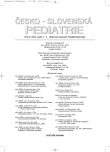-
Medical journals
- Career
Acute Renal Failure in Newborn Period – Initial Symptom of Inborn Error of Metabolism of Purines
Authors: J. Ferenczová 1; J. Behúnová 1; S. Šťastná 2; Ľ. Podracká 1
Authors‘ workplace: I. Klinika detí a dorastu LF UPJŠ a DFN, Košice prednostka prof. MUDr. Ľ. Podracká, CSc. 1; Ústav dědičných metabolických poruch VFN a UK 1. LF, Praha prednosta prof. MUDr. M. Elleder, DrSc. 2
Published in: Čes-slov Pediat 2008; 63 (1): 33-37.
Category: Case Report
Overview
Inborn error of metabolism (IEM) of purines associated with hyperuricemia is a rare cause of acute renal failure in childhood. It could be caused by a mutation in hypoxanthin-guanin-phosphoribosyl-transferase (HPRT) gene, leading to over production of uric acid and hyperuricosuria. Lesch-Nyhan syndrome (LNS) is an X-linked disease caused by complete deficiency of HPRT activity, while partial HPRT deficiency is termed Kelley-Seegmiller syndrome. LNS mainly affects the kidney – as acute and chronic urate nephropathy and urolithiasis, joints – gouty arthritis, and nervous system. Neurological symptoms include mental retardation, dystonia, spasticity, hyperreflexia. Psychiatric features could be serious and include self-mutilation tendency. Prognosis is bad.
Authors present a newborn boy with extreme hyperuricemia and acute renal failure (ARF), as a rare manifestation of IEM of purines. The 2 week-old boy was admitted with ARF, toxic dyspepsia and extreme hyperuricemia 2000 μmol/l. Due to oligo/anuria, creatinine 526 μmol/l, and glomerular filtration rate (GFR) 3.7 ml/min, acute peritoneal dialysis was indicated. This treatment led to an improvement of laboratory and clinical parameters. However, despite of the renal functions restoration (GFR 50 ml/min), hyperuricemia 700–800 μmol/l persisted. They excluded secondary causes of hyperuricemia; also high Kaufman index indicated overproduction of uric acid. For suspicion of purine IEM they estimated purine metabolites in urine and blood and enzyme activity of HPRT. The results reflected severe deficit of HPRT activity. Authors identified a novel mutation in intron 1 (c.27+2T>C) in the HPRT encoding gene. At present, the patient is one year old, with delayed psychomotor development and dystonia. Kidney ultrasound shows progression of renal impairment – reduction of renal parenchyma and calcifications.
The authors assume causality between ARF in newborn period (acute urate nephropathy) and diagnosis of purine IEM – severe deficiency of HPRT activity (Lesch-Nyhan syndrome). For managing the children with hyperuricemia, it is essential also to think about the possibility of a purine-metabolism disorder and to include the investigation of purine metabolism in differential diagnostic procedures.Key words:
newborn, acute renal failure, Lesch-Nyhan syndrome, hyperuricemia, acute urate nephropathy
Sources
1. Zumrová A, Šebesta I. Poruchy metabolismu purinů a pyrimidinů jako příčina neurologických poruch v dětském věku – současné možnosti diagnostiky. Čes.-slov. Pediat. 1999;12 : 707–716.
2. Simoni RE, Ferreira Gomes LNL, Scalco FB, et al. Uric acid changes in urine and plasma: An effective tool in screening for purine inborn errors of metabolism and other pathological conditions. J. Inherit. Dis. 2007;30 : 295–309.
3. Qazi Y, Lohr J. Hyperuricemia. hppt://www.emedicine. com/med/topic1112.htm.
4. Cameron JS, Moro F, Simmonds HA. Gout, uric acid and purine metabolism in paediatric nephrology. Pediatr. Nephrol. 1993;7(1): 105–118.
5. Stibůrková B, Šebesta I, Pospíšilová E, et al. Diferenciální diagnostika hyperurikémie u dědičných metabolických onemocnění. Klin. Biochem. 2005;13(34): 18–23.
6. Pajerek J, Kofer J, Kulenda Z, et al. Syndrom Leschův-Nyhanův. Čes.-slov. Pediat. 1984;6 : 327–329.
7. Jinnah HA. Lesch-Nyhan syndrome. http://www.emedicine.com/neuro/topic630.htm.
8. Conger JD. Acute uric acid nephropathy. Med. Clin. North Am. 1990;74(4): 859–871.
9. Rosenfeld DL, Preston MP, Salvaggi-Fadden K. Serial renal sonographic evaluation of patients with Lesch-Nyhan syndrome. Pediatr. Radiol. 1994;24 : 509–512.
10. Pais VM, Lowe G, Lallas CD, et al. Xanthine urolithiasis. Urology 2006;67 : 1084.e9–1084.e11.
11. Sikora P, Pijanowska M, Majewski M, et al. Acute renal failure due to bilateral xanthine urolithiasis in a boy with Lesch-Nyhan syndrome. Pediatr. Nephrol. 2006;21(7): 1045–1047.
12. Wingen AM, Loffler W, Waldherr R, Scharer K. Acute renal failure in an infant with partial deficiency of hypoxanthine-guanine phosphoribosyltransferase. Proc. Eur. Dial. Transplant. Assoc. Eur. Ren. Assoc. 1985;21 : 751–755.
13. Ankem MK, Glazier DB, Barone JG. Lesh-Nyhan syndrome presenting as acute renal failure secondary to obstructive uropathy. Urology 2000;56(6): 1056iii–1056v.
14. Cherian S, Crompton CH. Partial hypoxanthine-guanine phosphoribosytransferase deficiency presenting as acute renal failure. Pediatr. Nephrol. 2005;20(12): 1811–1813.
15. Kraus J. Leschův-Nyhanův syndrom. Čes.-slov. Pediat. 1982;3 : 167.
16. Jenkins EA, Hallett RJ, Hull RG. Lesch-Nyhan syndrome presenting with renal insufficiency in infancy and transient neonatal hypothyroidism. Br. J. Rheumatol. 1994;33(4): 392–396.
Labels
Neonatology Paediatrics General practitioner for children and adolescents
Article was published inCzech-Slovak Pediatrics

2008 Issue 1-
All articles in this issue
- Transcutaneous Bilirubinometry in Preterm Newborns
- Early Diagnostics of Asperger Syndrome and Specific Aspects
- Aspirated Foreign Bodies in Children
- Juvenile Myelomonocytic Leukemia Associated with Neurofibromatosis and Complicated by Hemophagocytic Syndrome
- Acute Renal Failure in Newborn Period – Initial Symptom of Inborn Error of Metabolism of Purines
- Neural Tube Defects – Current Opinion on Etiopathogenesis and Prevention Potencial of Folic Acid
- PROTEIN HYDROLYSATES IN PREVENTION AND THERAPY
- Czech-Slovak Pediatrics
- Journal archive
- Current issue
- Online only
- About the journal
Most read in this issue- Aspirated Foreign Bodies in Children
- Early Diagnostics of Asperger Syndrome and Specific Aspects
- Neural Tube Defects – Current Opinion on Etiopathogenesis and Prevention Potencial of Folic Acid
- Transcutaneous Bilirubinometry in Preterm Newborns
Login#ADS_BOTTOM_SCRIPTS#Forgotten passwordEnter the email address that you registered with. We will send you instructions on how to set a new password.
- Career

